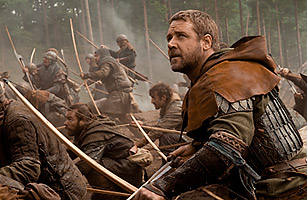
Russell Crowe stars in Robin Hood as the titular character
(2 of 2)
Scott supports Brian Helgeland's script with all the burly milling and whooshing arrows expected of an epic set in a more innocent era for artillery. And such veteran supporting players as Max von Sydow (as Loxley Sr.) and Eileen Atkins (as Eleanor of Aquitaine) deliver their lines with gusto. There's also the contemporary political parallel required in action movies that aspire to a three-figure IQ: Richard is easily seen as George W. Bush, who has wearied his nation with holy wars; his successor, King John (Oscar Isaac), taxing his subjects so heavily they mass in revolt, could be the Tea Party's deranged notion of Barack Obama. Robin is both a liberal in wanting to redistribute wealth and a conservative in backing the pleas of the landed class for their share of power. For history buffs, the big question is: Was it the legendary Robin Hood who forced the actual King John to sign the Magna Carta?
In film history no less than English history, Robin Hood has been a charismatic figure, from Douglas Fairbanks in silent days to Errol Flynn in the 1938 semiclassic to Sean Connery as an elder, more sour Hood in the 1976 Robin and Marian. Nor do we forget the '50s Brit TV series with Richard Greene or its immortal parody in the "Dennis Moore" episode of Monty Python's Flying Circus. Sing along now: "Dennis Moore, Dennis Moore / Riding through the land. / Dennis Moore, Dennis Moore / Without a merry band. / He steals from the poor / And gives to the rich. / Stupid bitch."
The Scott-Helgeland version tries to get at the "truth" behind the myth, though since Robin didn't appear in recorded English annals for several centuries after he was supposed to have lived, any truth is highly speculative. Of course, it's only a movie, so historical fidelity doesn't matter. What does matter is that this Robin has a hole in the middle. Crowe, who once invested any role with glamorous menace, is content to be the stalwart hero and not much else. He leaves the scheming to Strong and Isaac, the big speeches to aristocrats like William Hurt's Marshall and the poignant emoting to von Sydow. (His Merry Men are a drab lot as well.)
Robin's tryst with the widow Marion is a let's-let-people-think-we're-married ruse, useful in comedies from It Happened One Night to The Proposal but not a potent enough engine to drive an epic plot. In this pairing, Blanchett is the one to watch; emotions play on her face with subtle clarity as Marion grows from sullen mourner to poignant lover and, well, highly improbable warrior. A shame that, in Marion and Robin's big final scene on a beach, the waves keep splashing in the camera, obliterating all romantic intensity.
Last year's choice of the Pixar delight Up aside, the festival's opening-night film is rarely a masterpiece; it's meant to bring famous names to the Côte d'Azur and let the entertainment world know that Cannes is back in business. Crowe and Blanchett, two Oscar winners from Australia, will do that job this evening as they stride up the red carpet outside the Palais des Festivals. Meanwhile, another couple, the Corlisses, will be scouring the screening rooms for better movies. This 63rd Cannes fest is our 37th. We'll be posting news and reviews daily here at TIME.com, fair weather or foul. And so the festival begins.